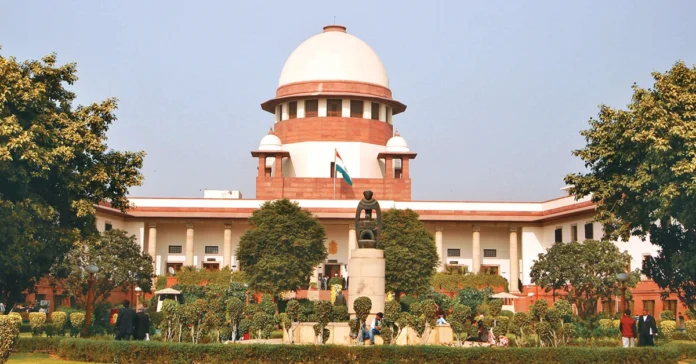A three-judge bench of the Supreme Court headed by Chief Justice of India (CJI) DY Chandrachud was hearing the issue of non-compliance with the directions of payment of arrears to judicial officers in terms of the Second National Judicial Pay Commission (SNJPC) recommendations. The Court noted that four states, which include Tamil Nadu, Himachal Pradesh, Meghalaya and Madhya Pradesh, so far have made complete compliance to the directions for clearing the arrears and allowances of the officers. With regards the remaining states and UTs, the Court pursued their affidavits on the status of compliance and granted four weeks’ time to ensure that the funds made available by the states are disbursed.
The Court directed that proceedings against West Bengal, Odisha, Bihar, Kerala, Jammu and Kashmir, Ladakh, Delhi, Jharkhand, Andhra Pradesh, Chhattisgarh, Assam, Nagaland and Haryana, to be closed. The CJI said that the chief secretaries and finance secretaries of these states have complied with the directions of the apex court on payment of arrears related to salary, pension and allowances to judicial officers. Now, there is no need to appear before the Court. The Court also said: “We have no pleasure in calling the chief and finance secretaries of the states, but the lawyers of the states have been continuously absent during the hearing on the matter.”
On August 22, the Supreme Court had directed the chief secretaries and finance secretaries of 18 states to be present in Court on August 27 for not implementing the recommendations of the SNJPC on payment of pension arrears and retirement benefits to judicial officers. They included Tamil Nadu, Madhya Pradesh, Andhra Pradesh, West Bengal, Chhattisgarh, Delhi, Assam, Nagaland, Meghalaya, Himachal Pradesh, Jammu and Kashmir, Ladakh, Jharkhand, Kerala, Bihar, Haryana and Odisha. “I can see there is no substantive compliance. They will have to personally appear before us or we will issue non-bailable warrants against them,” the CJI said.
The Court’s direction came after senior advocate K Parameshar, who is assisting the Court as amicus curiae, told the bench that despite several orders and extensions of time, states and union territories have not fully complied with the SNJPC recommendations. The bench was hearing a plea of All India Judges Association seeking enforcement of welfare and other measures for former judges and judicial officers. The bench said top bureaucrats will have to appear in person for the delay and rejected the request of several states that chief secretaries be allowed to appear virtually.
On July 11, the bench had summoned chief secretaries of 23 states on August 23 for non-compliance with the SNJPC recommendations. The amicus curiae in the case told the Court that five more states have meanwhile complied with the directions. Since the three-judge bench headed by the CJI was not available on August 23, the officers had to appear on August 27. The bench had made it clear that it would not grant any further extension to the states. Before this, the Court in its judgment on January 4 had directed the states to implement the recommendations of the SNJPC regarding pay and allowances for judicial officers and to pay the arrears by February 29.
In January 2024, in a significant ruling, the Supreme Court had said in its verdict that there was a need to maintain uniformity in the service conditions of judicial officers across the country. The bench had ordered the constitution of a committee of two judges in each High Court to monitor the implementation of the SNJPC recommendations on pay, pension and other retirement benefits of judicial officers. The Supreme Court had said it was a matter of grave concern that though officers of other services have availed the benefits of amendment in their terms of service on January 1, 2016, similar issues relating to judicial officers were still awaiting final decision even after eight years.
The bench said many judges have retired from service and family pensioners of those who have died are also waiting for a solution. The SNJPC recommendations cover pay structure, pension and family pension and allowances. The Commission has also considered the issue of setting up a permanent mechanism to determine the subjects of service conditions of the district judiciary. The Supreme Court had emphasised the unique role of the judiciary and differentiated it from other government services.
The CJI had said that “judges are not comparable with the administrative executive. They discharge sovereign judicial power, similar to the council of ministers, and unlike clerical staff or administrative officers who carry out executive decisions. Judicial officers stand alongside political executives and the legislature, not alongside government staff. Equating judicial service with other state offices is inappropriate.
The duties, restrictions and limitations affecting judges throughout their careers fundamentally differ from those in other services. Separation of powers necessitates distinct treatment for judicial officers compared to legislative and executive staff. Judges are not state employees; they hold public office and wield sovereign judicial power. In this sense, they are comparable only to legislators and ministers. Parity with legislative and executive staff cannot be claimed by judicial officers.”
—By Adarsh Kumar and India Legal Bureau


